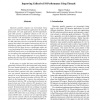Free Online Productivity Tools
i2Speak
i2Symbol
i2OCR
iTex2Img
iWeb2Print
iWeb2Shot
i2Type
iPdf2Split
iPdf2Merge
i2Bopomofo
i2Arabic
i2Style
i2Image
i2PDF
iLatex2Rtf
Sci2ools
108
click to vote
IPPS
1999
IEEE
1999
IEEE
Improving Collective I/O Performance Using Threads
Massively parallel computers are increasingly being used to solve large, I/O intensive applications in many different fields. For such applications, the I/O requirements quite often present a significant obstacle in the way of achieving good performance, and an important area of current research is the development of techniques by which these costs can be reduced. One such approach is collective I/O, where the processors cooperatively develop an I/O strategy that reduces the number, and increases the size, of I/O requests, making a much better use of the I/O subsystem. Collective I/O has been shown to significantly reduce the cost of performing I/O in many large, parallel applications, and for this reason serves as an important base upon which we can explore other mechanisms which can further reduce these costs. One promising approach is to use threads to perform the collective I/O in the background while the main thread continues with other computation in the foreground. In this pape...
Collective I/o | Distributed And Parallel Computing | I/O Intensive Applications | IPPS 1999 | Thread-based Collective I/o |
Related Content
| Added | 03 Aug 2010 |
| Updated | 03 Aug 2010 |
| Type | Conference |
| Year | 1999 |
| Where | IPPS |
| Authors | Phillip M. Dickens, Rajeev Thakur |
Comments (0)

